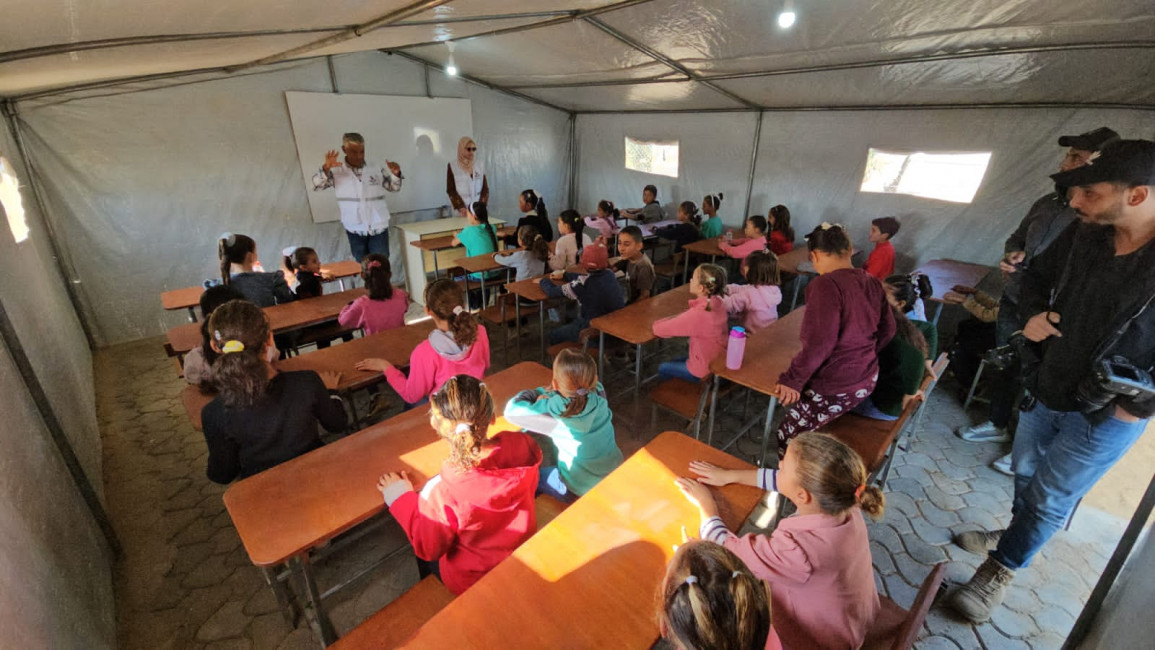After a year of Israel's 'educationicide', first school in Gaza reopens for 1,500 displaced students
In the Al-Mawasi area west of Khan Younis in the southern Gaza Strip, the first school of its kind was opened on November 1 to educate more than 1,500 displaced male and female students, whose educational path has been disrupted since the start of Israel's genocidal war on Gaza since October 2023.
For the second year in a row, around 630,000 male and female students in primary and secondary stages, in addition to 88,000 university students in the Gaza Strip, have been deprived their right to education due to the ongoing Israeli war.
The school, named "Mazoon Knowledge", (Mazoon is an ancient name for the Sultanate of Oman) was established by the Wafaa Al-Muhsinin Charitable Foundation, with funding from the Omani Endowment Fund to Support Distance Education.
"This school is equipped with all the necessary logistics, classrooms, green spaces, and many bathrooms that serve the students. It has a qualified teaching staff with previous experience in the field of education," the school's principal, Mohammed Al-Astal, told The New Arab.
Al-Astal explained that the idea of establishing this school came "to break the ignorance that has come to dominate the Palestinian generations after they stopped receiving education for more than a whole year."
He pointed out that the school is completely free, and currently provides its educational services to displaced students from the first to the fourth grade.
"We focused on containing students in these educational stages because they are among the most important educational stages, as they are the stages of upbringing and foundation," Al-Astal added, further noting that there is a plan in the coming months to expand and accommodate students up to the ninth grade.
Munira Hamed, the mother of one of the students enrolled in this school, told TNA, "Throughout the months of the war, I was extremely worried about my child because he was not receiving an education, and when I heard the news of the establishment of this school, I felt indescribable happiness."
"While the war continues to claim more lives in Gaza, we must not stop living. We must not surrender to death, ignorance and disease. We must remain committed to our rights to housing, education, health and a homeland," she added.
'Educationicide' in Gaza
Israel's war on Gaza has destroyed most educational institutions, schools, universities, colleges and educational government headquarters, putting Palestinian generations at risk of widespread illiteracy and ignorance.
According to the Central Bureau of Statistics, the illiteracy rate in Palestine is one of the lowest in the world, reaching 2.2% among the Palestinian population (15 years and above) in 2022.
UN experts reported that this war has destroyed more than 80% of Gaza's schools.
"With over 80% of Gaza's schools damaged or destroyed, there appears to be a deliberate attempt to destroy the entire Palestinian education system, in what is known as 'educationicide,'" 24 UN experts said in a joint statement published on 18 April 2024.
The losses in Gaza's educational sector are estimated at over $720 million, according to the International Monetary Fund.
During its war on Gaza, the Israeli army completely destroyed 125 schools and universities, and 336 schools and universities partially, according to what the spokesperson for the Ministry of Education, Sadiq al-Khadour.
Al-Khadour reported that during this war, the Israeli army killed at least 11,738 male and female students, 750 male and female teachers, 115 scientists, university professors and researchers, including university presidents and deans of university colleges.
The ministry's spokesperson agreed with the UN experts assessment that the Israeli army deliberately targets educational institutions, and said, "Israel follows a systematic policy of targeting educational centres in the Strip, with the aim of spreading ignorance among Palestinian generations and ending the existence of any place for study even after the end of the war."
He explained that during its war, the Israeli army worked to transform schools and universities into military barracks and bases for its tanks and military vehicles and pointed out that the Gaza Strip needs several years to restore the educational sector.
Last January, the Euro-Mediterranean Human Rights Monitor highlighted in a statement that the ongoing Israeli military attacks on the Gaza Strip have completely disrupted the educational process in universities, colleges and community centres.
The organisation indicated that three university presidents were killed as a result of the Israeli raids, along with more than 94 deans and university professors, adding that out of the six universities in the Gaza Strip, five universities were destroyed, three of which were completely destroyed. It is worth noting that these numbers are not final, given the ongoing Israeli war to this day.
It also stressed that the targeting of civilian objects by armed forces, especially those that constitute historical or cultural monuments protected by special laws, "is not only a serious violation of international humanitarian law and a war crime under the Rome Statute of the International Criminal Court, but also falls within the scope of the crime of genocide."
Are 'virtual schools' a solution?
In the context of the Ministry of Education's attempts to include students in the educational process, the ministry recently announced the launch of virtual schools for students in Gaza, most of whom have become displaced and live in tents inside shelters.
Those in charge of these virtual schools are working to publish educational content for all subjects via electronic platforms. However, this project faces immense difficulties, most notably the lack of internet in the shelter camps.
"Virtual schools are a failed and useless project, because most students do not have internet access," Adel Muhaisen, a displaced person in Deir al-Balah in the central Gaza Strip with four children, told TNA.
Most internet researchers are forced to travel long distances of up to several kilometres to connect to the outside world or to find out what is happening around them.
"There are also no smartphones available to follow the educational process electronically," Mohsen added, noting that the prices of these phones have increased at least fivefold because Israel has not allowed any electronic products to enter the besieged coastal enclave since the war began.
Mohsen believes that the best solution would be to enhance face-to-face education by establishing more schools such as the “Mazoon Knowledge School,” even if the classrooms are tents.




 Follow the Middle East's top stories in English at The New Arab on Google News
Follow the Middle East's top stories in English at The New Arab on Google News
![The US vetoed a UN Security Council (UNSC) resolution demanding a ceasefire in Gaza [Getty]](/sites/default/files/styles/image_330x185/public/2185152251.jpeg?h=7ef8ac04&itok=RpLSj2pu)

![An attack by paramilitary forces in Sudan has killed at least 40 people [Getty]](/sites/default/files/styles/image_330x185/public/2182364341.jpeg?h=a5f2f23a&itok=r8Fkhxdj)